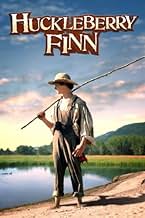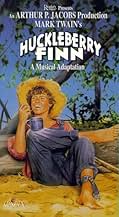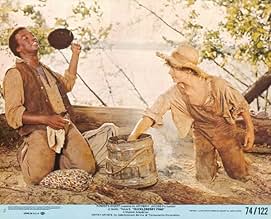In 1840s Missouri, young Huckleberry Finn, wanting to escape his violent drunkard father, joins Black runaway slave Jim on a quest for freedom down the Mississippi River on a raft.In 1840s Missouri, young Huckleberry Finn, wanting to escape his violent drunkard father, joins Black runaway slave Jim on a quest for freedom down the Mississippi River on a raft.In 1840s Missouri, young Huckleberry Finn, wanting to escape his violent drunkard father, joins Black runaway slave Jim on a quest for freedom down the Mississippi River on a raft.
- Director
- Writers
- Stars
- Director
- Writers
- All cast & crew
- Production, box office & more at IMDbPro
Featured reviews
Actually, not a bad film that follows the Twain book pretty well (probably because it's a Readers Digest production), but is about as dated as the book actually is and a product of the era in which the story takes place. This doesn't mean that the overall film doesn't hold a place in either American literature or film history. It's a musical without being an overpowering musical (which is good for me since I'm not a musical fan). Unfortunately, I see modern audiences avoiding this film without appreciating its innocence and morals and original intentions. If you've seen this film, what did you think of it?
Unnecessary and unsatisfying musical rendering of Mark Twain's classic "Adventures of Huckleberry Finn". At least, it captures the genuine friendship between Jeff East (as Huckleberry Finn) and Paul Winfield (as Jim). However, these two performers are much more likable in other projects. Interestingly, Mr. East portrayed "Huck" in 1973's similarly presented re-make of "Tom Sawyer", which was considered the better film. In my opinion, East would have been a better "Tom" than "Huck". Some of the photography is rather nice, especially during the more moody ending. The Sherman-Sherman musical numbers are well below standard. The movie doesn't seem much like the book. Roberta Flack sings "Freedom" to end it all, at last.
*** Huckleberry Finn (1974) J. Lee Thompson ~ Jeff East, Paul Winfield, Harvey Korman
*** Huckleberry Finn (1974) J. Lee Thompson ~ Jeff East, Paul Winfield, Harvey Korman
A forgotten relic from the early '70s, when shows like "Little House on the Prairie" and "The Waltons" all reflected our yearning for a so-called simpler, less complicated era. This adaptation, while not entirely faithful to the book, captures its essential themes and spirit rather well. There are some technical problems (the lighting always seem to be half in shadow, whether it's night or day!) and its kiddie-friendly tone seems at odds during the Grangerfords/Shepherdsons sequence, wherein we see men being shot and killed right on camera--and it's handled rather lightly. Parents should also be warned that this adaptation does have some strong language--it has not been sanitized, notwithstanding its G rating.
In addition, the musical format sits much more uneasily with this movie than with the superior "Tom Sawyer" (from the year before, with many of the same cast members and production staff). However, as oddly as some numbers come off, others are wonderful, such as the clever, dixie-ish "Cairo, Illinois," a duet between Huck and Jim that kicks off their great journey together. The jaunty title song and the lovely anthem "Freedom" also showcase the movie and its themes beautifully--especially during "Freedom"'s reprise, as Huck, the boy/man run away, gazes after Jim making his way downriver. Performances are generally strong--Jeff East could've been a better singer but his performance is so sincere and authentic, you hardly notice. Likewise his bond with Jim (well-portrayed by the late Paul Winfield) comes through nicely, most especially in their final, very moving scene together. Harvey Korman and David Wayne also deliver terrific turns as the King and the Duke, respectively.
Cinematography is *gorgeous*--the DP took full advantage of the location shoot, with some beautiful silhouette shots. Although its prequel is far better (you simply cannot top "Tom Sawyer"'s terrific score and thoroughbred cast), Mark Twain's quintessential Great American novel is reasonably well-served here, if not transcendently.
In addition, the musical format sits much more uneasily with this movie than with the superior "Tom Sawyer" (from the year before, with many of the same cast members and production staff). However, as oddly as some numbers come off, others are wonderful, such as the clever, dixie-ish "Cairo, Illinois," a duet between Huck and Jim that kicks off their great journey together. The jaunty title song and the lovely anthem "Freedom" also showcase the movie and its themes beautifully--especially during "Freedom"'s reprise, as Huck, the boy/man run away, gazes after Jim making his way downriver. Performances are generally strong--Jeff East could've been a better singer but his performance is so sincere and authentic, you hardly notice. Likewise his bond with Jim (well-portrayed by the late Paul Winfield) comes through nicely, most especially in their final, very moving scene together. Harvey Korman and David Wayne also deliver terrific turns as the King and the Duke, respectively.
Cinematography is *gorgeous*--the DP took full advantage of the location shoot, with some beautiful silhouette shots. Although its prequel is far better (you simply cannot top "Tom Sawyer"'s terrific score and thoroughbred cast), Mark Twain's quintessential Great American novel is reasonably well-served here, if not transcendently.
Talented filmmaker J. Lee Thompson stages this musical version of Mark Twain's "The Adventures of Huckleberry Finn" with artificial verve, and nothing in it looks quite right or plays at the appropriate tempo. Stolen from his guardians by his delinquent father, Huckleberry Finn stages his own death and hits the Mississippi River with friend Jim the Slave (why the two don't return to the sisters whom Jim works for is never made clear--both he and Huckleberry would certainly benefit from their generosity). Songwriters Richard and Robert Sherman, who also adapted the screenplay, seemed to lose their way musically once their mentor, Walt Disney, died; here, their songs are like leaden chapter stops in the narrative, not that the actors have much musical range. Teen star Jeff East doesn't even have music in his speaking voice, and he crawls through the picture lethargically, talking through his nose as if he had a cold. Paul Winfield fares better as Jim, though this pictorial, phony journey must have seemed quite a comedown after his "Sounder". Cinematographer László Kovács gets some beautiful shots of the raft on the water, but the limp direction and editing makes nearly all of Kovács' compositions look poorly framed. The color schemes are gloppy, with day scenes appearing as dusk and vice-versa. Director Thompson, who makes the white folks look like doddering scoundrels and the black folks look like grinning simpletons, can't work up a cohesive pace for the picture, and it jostles about from one poor vignette to the next. This was a follow-up by financiers Reader's Digest to 1973's "Tom Sawyer"; as with that film, a TV-version was right on their heels, in this case 1975's "Huckleberry Finn" starring Ron Howard and Donny Most. * from ****
Lovers of Huckleberry Finn might cringe at the liberties taken in this film, particularly at the end. The end that Twain wrote for the book wasn't very strong, with Tom Sawyer returning and making a muck of things. This is not the only version of Huck Finn that tries an alternate ending.
As a musical, this film does not work. The numbers are awkwardly placed and spaced, and some of the actors are unsure of their singing altogether. The songs in the companion film Tom Sawyer work better because they are usually sung as a voiceover, serving as an internal dialogue.
Another basic problem with this adaptation is that some of the most interesting events in the story take place offscreen. You only hear them described afterwards, which is a very weak storytelling device.
But oh, the memories! I saw this film when I was in my early teens, and I immediately fell for the young actor Jeff East in the title role. It was a great movie in my opinion back then, so as a recommendation to youngsters and pre-teenage girls, I can't do better now!
As a musical, this film does not work. The numbers are awkwardly placed and spaced, and some of the actors are unsure of their singing altogether. The songs in the companion film Tom Sawyer work better because they are usually sung as a voiceover, serving as an internal dialogue.
Another basic problem with this adaptation is that some of the most interesting events in the story take place offscreen. You only hear them described afterwards, which is a very weak storytelling device.
But oh, the memories! I saw this film when I was in my early teens, and I immediately fell for the young actor Jeff East in the title role. It was a great movie in my opinion back then, so as a recommendation to youngsters and pre-teenage girls, I can't do better now!
Did you know
- TriviaThis was the first musicalization of Huckleberry Finn. The next one happened 10 years later in 1985, on Broadway; it was "Big River." a hit show which ran for several years and won seven Tonys, including Best Musical.
- Quotes
Huckleberry Finn: I don't give a damn what the whole world says, 'cause if I'm doin' wrong--well--well, I hope I roast in hell forever.
- ConnectionsFollows Tom Sawyer (1973)
- How long is Huckleberry Finn?Powered by Alexa
Details
- Release date
- Country of origin
- Official site
- Language
- Also known as
- Mark Twain's Huckleberry Finn: A Musical Adaptation
- Filming locations
- Production companies
- See more company credits at IMDbPro
Box office
- Budget
- $3,000,000 (estimated)
- Runtime1 hour 58 minutes
- Color
- Aspect ratio
- 2.35 : 1
Contribute to this page
Suggest an edit or add missing content































